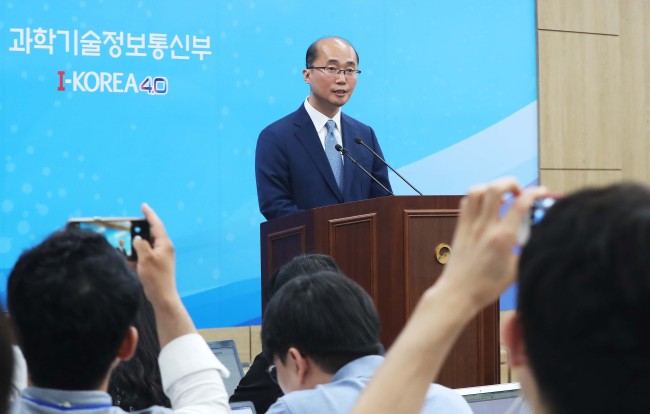South Korean mobile carriers on Monday secured frequency spectrums for the upcoming fifth-generation network in an auction at a total of 3.6 trillion won ($3.26 billion), the Ministry of Science and ICT said.
The auction ended on its second day, and the total winning price was higher than the government’s asking price of 3.3 trillion won.
The auction ended on its second day, and the total winning price was higher than the government’s asking price of 3.3 trillion won.

Korea’s No. 1 operator SK Telecom and runner-up KT took 100 MHz bandwidths in the 3.5 Ghz frequency, the most competitive spectrum. LG Uplus secured the remaining 80 MHz.
The positions of each firm’s blocks are: SKT at 3.6-3.7 GHz, KT at 3.5-3.6 GHz and LG Uplus at 3.42-3.5 GHz.
The total price of the 3.5 GHz was 2.99 trillion won, higher than the starting price of 2.6 trillion won.
The telecom companies equally took 800 MHz bandwidths of the 28 GHz frequency at 621.6 billion won.
All three expressed satisfaction with the auction result.
“SKT has won the largest amount of 100 MHz bandwidth and the so-called ‘golden area’ of the bandwidth, being able to lead commercialization of 5G services,” the company said.
KT also assessed that the auction was reasonable and it is content with the result.
“The bandwidths we secured will be used for the fastest 5G services,” it said.
LG Uplus said it made a “practical decision” to buy the 28 GHz frequency, and it will be helpful to develop 5G services that are differentiated from others.
The mobile carriers were bidding for 28 blocks in the 3.5-gigahertz spectrum and 24 blocks in the 28 GHz spectrum, with a total price set by the government at 3.3 trillion won ($3.11 billion).
The Ministry of Science and ICT had for the first time introduced a clock auction, in which the auctioneer begins with a high asking price and lowers it until a participant accepts the price.
The auction was divided into two phases.
During the first phase, the three companies were to decide the number of blocks they wanted to purchase. They were to decide the positions of the frequencies in the next phase.
In each round, the ministry set an asking price, and the companies decided how many blocks they would buy at the government’s price.
For a fairer auction for all three companies, the ministry also offered the bidders the chance to set prices on their own and adjust the block numbers on the condition that the company’s price should be higher than the winning price in the previous round.
By Song Su-hyun
(song@heraldcorp.com)
The positions of each firm’s blocks are: SKT at 3.6-3.7 GHz, KT at 3.5-3.6 GHz and LG Uplus at 3.42-3.5 GHz.
The total price of the 3.5 GHz was 2.99 trillion won, higher than the starting price of 2.6 trillion won.
The telecom companies equally took 800 MHz bandwidths of the 28 GHz frequency at 621.6 billion won.
All three expressed satisfaction with the auction result.
“SKT has won the largest amount of 100 MHz bandwidth and the so-called ‘golden area’ of the bandwidth, being able to lead commercialization of 5G services,” the company said.
KT also assessed that the auction was reasonable and it is content with the result.
“The bandwidths we secured will be used for the fastest 5G services,” it said.
LG Uplus said it made a “practical decision” to buy the 28 GHz frequency, and it will be helpful to develop 5G services that are differentiated from others.
The mobile carriers were bidding for 28 blocks in the 3.5-gigahertz spectrum and 24 blocks in the 28 GHz spectrum, with a total price set by the government at 3.3 trillion won ($3.11 billion).
The Ministry of Science and ICT had for the first time introduced a clock auction, in which the auctioneer begins with a high asking price and lowers it until a participant accepts the price.
The auction was divided into two phases.
During the first phase, the three companies were to decide the number of blocks they wanted to purchase. They were to decide the positions of the frequencies in the next phase.
In each round, the ministry set an asking price, and the companies decided how many blocks they would buy at the government’s price.
For a fairer auction for all three companies, the ministry also offered the bidders the chance to set prices on their own and adjust the block numbers on the condition that the company’s price should be higher than the winning price in the previous round.
By Song Su-hyun
(song@heraldcorp.com)








![[Graphic News] More Koreans say they plan long-distance trips this year](http://res.heraldm.com/phpwas/restmb_idxmake.php?idx=644&simg=/content/image/2024/04/17/20240417050828_0.gif&u=)
![[KH Explains] Hyundai's full hybrid edge to pay off amid slow transition to pure EVs](http://res.heraldm.com/phpwas/restmb_idxmake.php?idx=644&simg=/content/image/2024/04/18/20240418050645_0.jpg&u=20240419100350)





![[From the Scene] Monks, Buddhists hail return of remains of Buddhas](http://res.heraldm.com/phpwas/restmb_idxmake.php?idx=652&simg=/content/image/2024/04/19/20240419050617_0.jpg&u=20240419175937)

![[KH Explains] Hyundai's full hybrid edge to pay off amid slow transition to pure EVs](http://res.heraldm.com/phpwas/restmb_idxmake.php?idx=652&simg=/content/image/2024/04/18/20240418050645_0.jpg&u=20240419100350)

![[Today’s K-pop] Illit drops debut single remix](http://res.heraldm.com/phpwas/restmb_idxmake.php?idx=642&simg=/content/image/2024/04/19/20240419050612_0.jpg&u=)